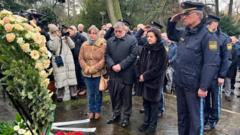In response to a recent knife attack in Aschaffenburg that resulted in the deaths of a two-year-old child and a 41-year-old man, Friedrich Merz, leader of the German opposition and candidate for chancellor, is pledging to implement sweeping changes to the country's border and asylum rules.
German Opposition Leader Calls for Permanent Border Controls Following Knife Attack

German Opposition Leader Calls for Permanent Border Controls Following Knife Attack
Friedrich Merz vows to change asylum and immigration policies following deadly incident in Bavaria targeting a group of children.
The attack, attributed to a 28-year-old Afghan man who arrived in Germany in 2022 and has a history of violence, has sparked urgent calls from both Merz and Chancellor Olaf Scholz to reevaluate Germany's immigration policies. Merz has declared that on his first day as chancellor, he would task the interior ministry with reinstating permanent control over Germany's borders, aiming to block all irregular migration, including those with asylum rights. He criticized the current immigration framework as having led to a breakdown in safety and security, suggesting that the country has reached its limit.
Merz's hardline stance comes as the conservative Christian Democrats are polling highly ahead of the federal elections on February 23. In contrast, Scholz condemned the attack as an "act of terror," despite a lack of evidence indicating a terrorist motivations. The opposition has seized upon this incident to bolster their calls for stricter immigration control amidst rising influence from the far-right Alternative for Germany (AfD) party, which has made immigration a pivotal issue in its platform.
The Afghan suspect is currently in court facing charges of murder and other offenses. Political rivals have expressed concern that calls for tougher measures may only serve to empower extremist factions within German politics. Amidst varying viewpoints, the urgent debate over national security and immigration continues as the nation heads toward its elections.
Merz's hardline stance comes as the conservative Christian Democrats are polling highly ahead of the federal elections on February 23. In contrast, Scholz condemned the attack as an "act of terror," despite a lack of evidence indicating a terrorist motivations. The opposition has seized upon this incident to bolster their calls for stricter immigration control amidst rising influence from the far-right Alternative for Germany (AfD) party, which has made immigration a pivotal issue in its platform.
The Afghan suspect is currently in court facing charges of murder and other offenses. Political rivals have expressed concern that calls for tougher measures may only serve to empower extremist factions within German politics. Amidst varying viewpoints, the urgent debate over national security and immigration continues as the nation heads toward its elections.


















